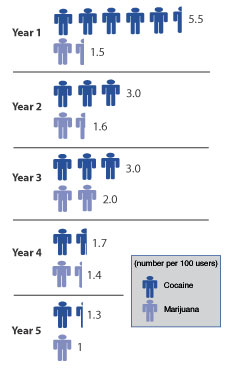Study Sheds Light on Progression to Drug Dependence
 Users Who Develop Drug Dependence During Each Year After First Use. Among cocaine users, more than 5 percent develop dependence during their first year of using the drug. Marijuana dependence develops less explosively, but the likelihood is greatest in the first years of use.
Users Who Develop Drug Dependence During Each Year After First Use. Among cocaine users, more than 5 percent develop dependence during their first year of using the drug. Marijuana dependence develops less explosively, but the likelihood is greatest in the first years of use.An understanding of the circumstances that lead from first use of a drug to drug dependence can lead to the development of more effective prevention programs. NIDA-supported researcher Dr. James Anthony and colleagues at the Johns Hopkins University examined data from the National Comorbidity Survey (NCS) to determine the ages at which individuals are at greatest risk of starting to use marijuana or cocaine and to map their patterns of progression to dependence on the drugs. The NCS, conducted between 1990 and 1992, was designed to gather comprehensive mental health information about the U.S. population and involved detailed interviews with more than 8,000 women and men aged 15 to 54.
The researchers found that first use of marijuana occurs on average at age 18, and roughly 9 percent of users will become dependent on the drug, most likely before age 25. For cocaine, first use is most likely at age 20 and progression to dependence is more rapid; the peak incidence of transition to dependence occurs between ages 23 and 25. Roughly 21 percent of persons who use cocaine at least once will become dependent, most likely by age 45.
"These patterns illustrate the cumulative risk of continued drug use," says Dr. Coryl Jones, formerly of NIDA's Epidemiology Research Branch. "For some, using marijuana or cocaine once or twice may not lead to dependence, but the risk is always there. Factors such as health, personal problems, or stress may slowly or suddenly combine to tip the balance from drug use to drug dependence."
Retiring Advisory Council Members
 Richard A. Millstein (right), NIDA's deputy director, expresses gratitude in behalf of the Institute to retiring members of the National Advisory Council on Drug Abuse: Dr. Kathy Sanders-Phillips, Dr. Perry Renshaw, and Dr. Kathleen Brady.
Richard A. Millstein (right), NIDA's deputy director, expresses gratitude in behalf of the Institute to retiring members of the National Advisory Council on Drug Abuse: Dr. Kathy Sanders-Phillips, Dr. Perry Renshaw, and Dr. Kathleen Brady.